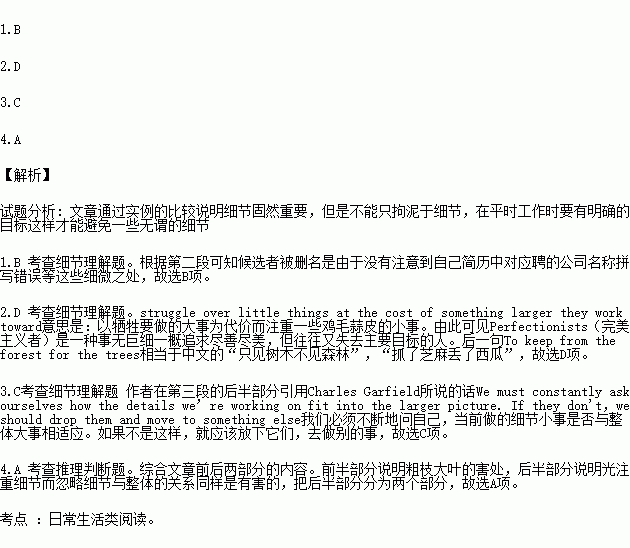题目内容
D
Attention to detail is something everyone can and should do — especially in tight job market.
Bob Crossley, a human-resources expert notices this in the job applications that come across his desk every day. “It’s amazing how many candidates eliminate (淘汰) themselves,” he says. “Resumes (简历) arrive with faults. Some candidates don’t bother to spell the company’s name correctly. Once I see a mistake, I refuse the candidates,” Crossley concludes,” If they cannot take care of these details, why should we trust them with a job?”
Can we pay too much attention to details? Absolutely not.
Perfectionists(完美主义者) struggle over little things instead of something larger they work toward. “To keep from losing the forest for the trees,” says Charles Garfield, the professor at the University of California, San Francisco, “We must constantly ask ourselves how the details we’re working will influence the larger picture. If they don’t, we should drop them and move to something else.”
Garfield compares this process to his work as a computer scientist at NASA. “The Apollo II moon launch was slightly off-course 90 percent of the time,” says Garfield. “But a successful landing was still likely because we knew the exact position of our goal. This allowed us to make adjustments as necessary.” Knowing where to go helps us judge the importance of every task we undertake.
Again and again, we see that by doing little things within our grasp well, large rewards follow.
1.According to the passage, some job applicants were refused because they are ________.
A. too limitedly educated to write a perfect resume
B. so careless that they make some spelling mistakes in their resume
C. so careless that they forget the company’s name
D. too foolish to spell the company’s name correctly
2.From the passage, we can infer that a perfectionist will _________.
A. change their goals as the situations change
B. lose their jobs by paying too much attention to details
C. pay attention to details as much as to their major goals
D. pay attention to details more than their major goals
3.Garfield makes his opinion believable by _________.
A. giving ideas of experts
B. offering examples of resumes
C. providing an example of his work.
D. showing the results of experiments
4.Which of the following best shows the structure of the passage?

I: Introduction P:Point Sp: Sub-point (次要点)C: Conclusion

